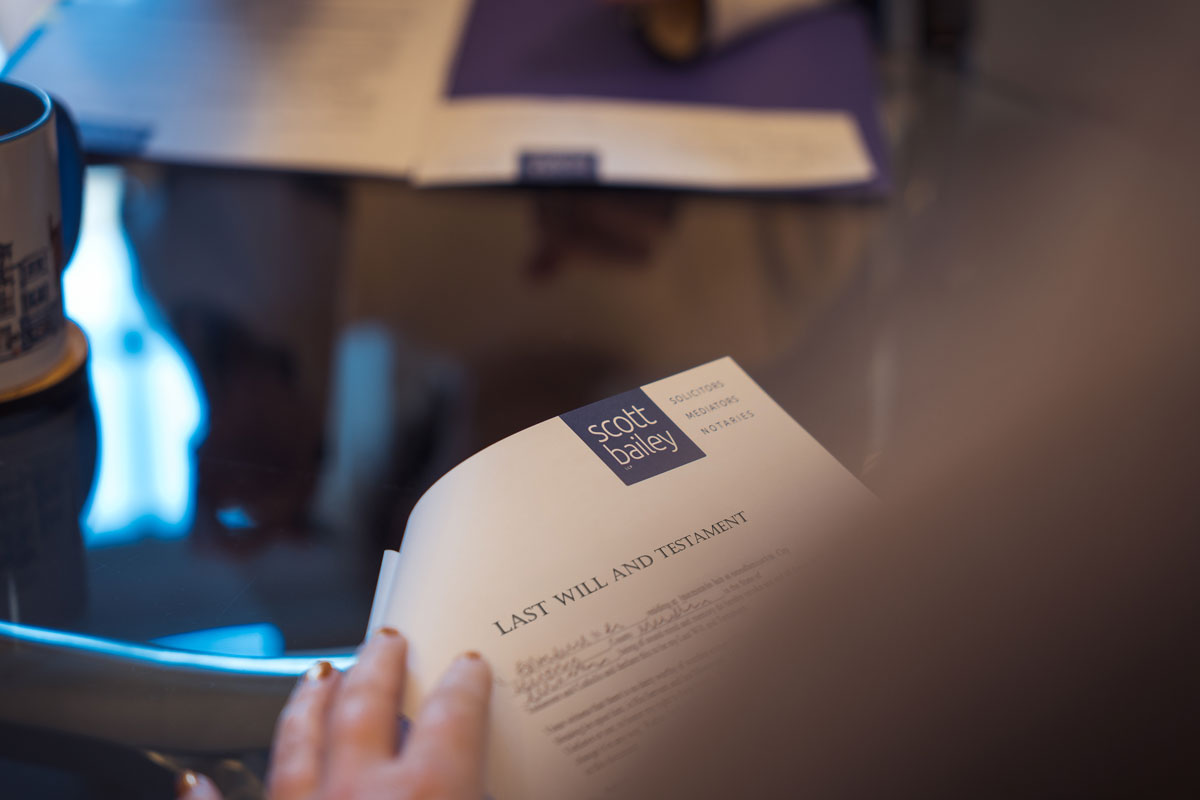What happens if you don’t leave a will?
With over half of UK adults not having a will in place, this is a commonly asked question. If you die without making a valid will, it will be classed as ‘dying intestate’. This means your estate – everything you owned, from property and savings to personal possessions – must be divided according to the legal rules of intestacy.
The rules of intestacy do provide some level of structure at an uncertain time – but they do not always align with what families are expecting. We often find that they create additional stress. Losing someone close to you is one of life’s most difficult experiences; as well as coping with grief and emotional upheaval, there are practical matters that need to be dealt with which are much harder without a will in place.
In this article, our Wills, Trusts and Probate solicitors explain what intestacy means, who is entitled to inherit, who is responsible for dealing with the estate, and what you can do if your loved one has passed away without a will.
What does intestacy mean?
if you die without making a will, your estate is distributed according to the intestacy rules in England and Wales. These rules are set in law and apply automatically.
They do not take into account personal wishes, verbal promises, or the needs of those left behind. For families, this can feel deeply unfair, especially when the outcome is very different from what the deceased may have intended.
Who is entitled to inherit under intestacy?
The intestacy rules follow a fixed order of priority. Who is entitled depends on the circumstances at the time of death:
- Married couples and civil partners – if there are no children, the surviving husband, wife or civil partner usually inherits the whole estate. If you have children, the surviving spouse or civil partner receives all personal belongings, the statutory legacy (the first £322,000 of the estate), and half of anything above this amount. The children share the other half of what remains equally. If the children are minors, their share is held in trust until they turn 18.
- Children – only biological and legally adopted children inherit automatically. Stepchildren are not recognised unless they have been formally adopted. This often comes as a surprise to families and can lead to stepchildren being excluded, even if they were treated as part of the family.
- Unmarried partners – cohabiting partners are not recognised by the intestacy rules, no matter how long they lived together. If your loved one died without a will and you were not married or in a civil partnership, you will not automatically inherit anything. If there are children, the estate will pass to them; otherwise, it will pass to other relatives. In some cases, this can leave a surviving partner in a very difficult position – for example, if the family home was owned solely by the deceased. While it may be possible to make a claim against the estate under the Inheritance (Provision for Family and Dependants) Act 1975, this is a separate legal process that can be complex and stressful.
- Other relatives – if there is no spouse, civil partner or children, the estate passes to other relatives in a strict order: parents, then siblings, then nieces and nephews, and so on. If it’s not possible to trace any living relatives, the estate passes to the Crown, and this is known as “Bona vacantia”.
The impact of intestacy on families
For families already coping with loss, intestacy can bring additional stress. Unmarried partners or stepchildren are left out – even if they were financially dependent. This often causes disputes between relatives, especially in blended families or where relationships were strained. The risk of financial hardship is heightened if loved ones suddenly find they have no entitlement to the family home or savings, and sorting out matters often takes longer and may involve additional costs and legal challenges.
These situations can feel incredibly unfair. They can also be emotionally draining, as families may have to balance their grief with the practical reality of dealing with an estate that doesn’t reflect the deceased’s wishes.
Who deals with the estate when there is no will?
When a will is in place, it usually names executors who are responsible for managing the estate, and they are chosen by the deceased.
Without a will, this responsibility falls to an administrator, usually the closest living relative, in an order set by law. To carry out their role, the named administrator must apply for a Grant of Letters of Administration. This legal document gives them authority to collect assets, pay debts, and distribute what is left according to the intestacy rules.
The process can be time-consuming and, in some cases, complicated – particularly if there are disagreements between relatives, or if the estate includes property, business assets or overseas elements.
Frequently asked questions
What happens to property if you die without making a will?
What happens to a family home or other property depends on how it was owned. If it were owned as joint tenants, then the deceased’s share will automatically pass to the surviving co-owner, regardless of the intestacy rules.
If the property was owned as tenants in common, then the deceased’s share passes under the intestacy rules, which can lead to unexpected co-ownership with other family members.
What happens to your businesses if you die without a will?
Dying without a will means your business could face severe disruption, disputes and tax inefficiencies. For sole traders, the business stops immediately, and assets can be frozen. In partnerships, the business may dissolve unless there’s a formal agreement in place. For limited companies, your shares may pass under intestacy rules, which could hand control to unintended beneficiaries.
Intestacy can create significant challenges if your loved one owned a business and died without a will in place. Shares or partnership interests may pass to relatives who have no involvement in the business, which is particularly difficult if there are employees and other stakeholders involved. Having to resolve these issues can place extra strain on grieving families, so it is always best to have clear instructions in place to prevent this.
What you can do if your loved one has died without leaving a will?
If you find yourself in this situation, it is important to seek professional advice before attempting to manage the estate yourself. Every family’s circumstances are different, and intestacy can produce complex or unexpected outcomes.
Our experienced Wills, Trusts and Probate team is here to help. We can explain exactly what the intestacy rules mean for your family, and clarify who is entitled to inherit.
If needed, we can apply for the Grant of Letters of Administration on your behalf and will support you in carrying out your role as administrator.
We can also advise on property, business or tax issues, which can help reduce the risk of disputes between family members, ease the burden of stress, and allow you to focus on your own wellbeing and your family at such a difficult time.
Contact Scott Bailey for advice and guidance
We understand how hard it is to deal with legal and financial matters after losing someone close to you. We have been guiding families through difficult situations for generations with a professional and reliable approach, giving you confidence that everything is being handled properly.

Visit our wills, trusts and probate page to find out more about the services we offer.
If you are facing the loss of a loved one who did not leave a will, please contact us today.










